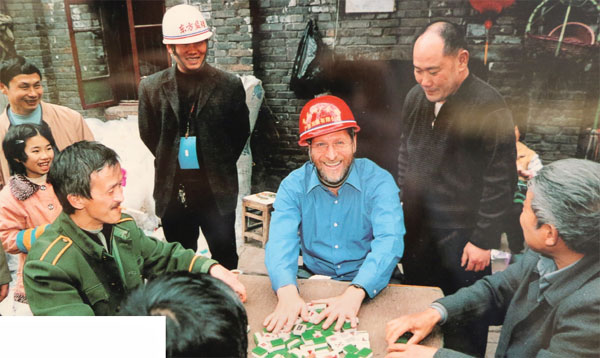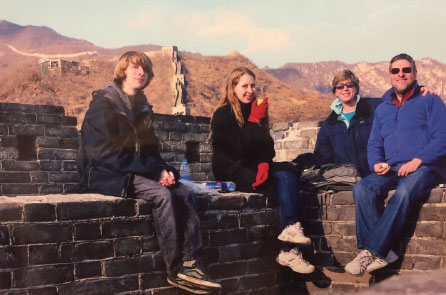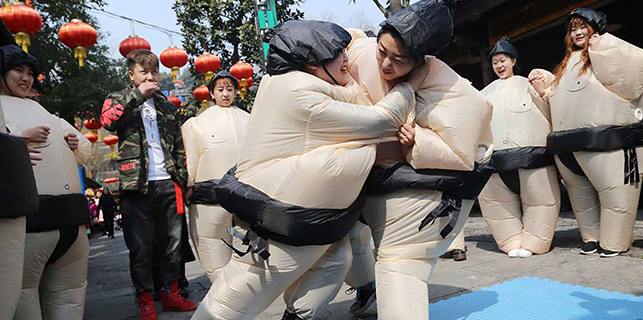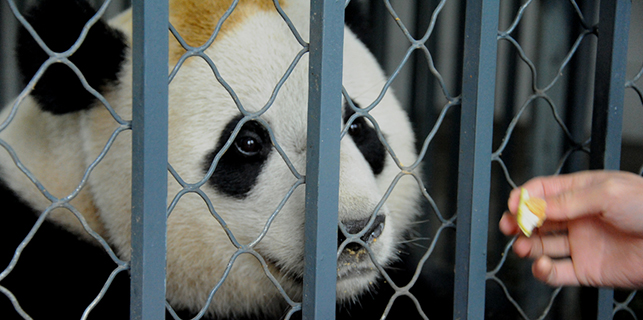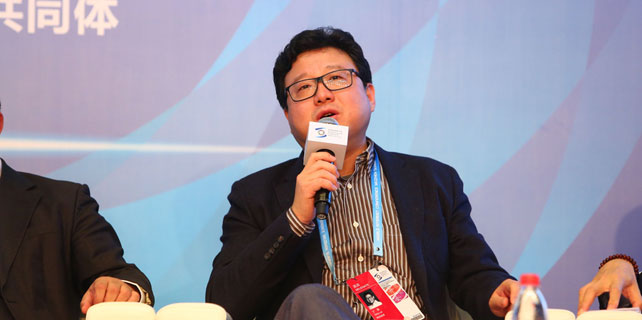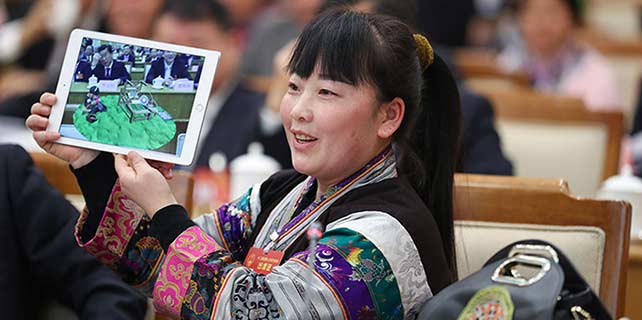An economist on China
David Dollar has spent a lifetime studying China, including nearly a decade living and working in China as a professor, World Bank official and US Treasury emissary
David Dollar was about to graduate from high school when US President Richard Nixon made his historic trip to China in February 1972. He enrolled in Dartmouth College to study Chinese language and history.
Now a senior fellow at the John L. Thornton China Center of the Brookings Institution, Dollar recalled that Nixon's trip caught a lot of attention on television in the US "in the sense that China was starting to open up".
"It was the beginning of a new era. So I think that influenced me to study Chinese language and Chinese history," he told China Daily in his Brookings office.
Pictures on the wall show his close connection with China, such as ones with his family on the Mutianyu section of the Great Wall outside Beijing, playing mahjong during a break at a World Bank project site in Chongqing, and a 2006 group photo of him with then Premier Wen Jiabao and other recipients of the Friendship Award, the top prize for foreign experts working in China.
At Dartmouth, Dollar studied Chinese history and politics, everything from the communist revolution to the founding of the People's Republic.
He liked the small classes with specialized faculty at Dartmouth. Some classes had five or six students. The Chinese language was difficult, he admitted.
Finishing Dartmouth in just three years, Dollar received a fellowship to study Chinese at a university in Taiwan. He spent the academic year living with a local family and spoke Chinese every day. "Back then, my Chinese was mamahuhu (so so), not bad," he said.
Taiwan just had a new leader Chiang Ching-kuo, son of former leader Chiang Kai-shek who passed away in April 1975. The Taiwan economy was taking off and exports were booming, very much like what would happen on the Chinese mainland a decade later.
"That was when I got interested in economics, watching the export boom in Taiwan," Dollar said.
Returning to the US, he went in the PhD program at New York University, focusing on international trade and investment. He remembers the macroeconomics exam on balance of payment back then is still quite relevant today.
First trip to China
After graduating in 1984, Dollar went to teach economics at UCLA, a school that had quite a few collaborative programs with China. In 1986, he made his first trip to the Chinese mainland, teaching for six months at the Graduate School of the Chinese Academy of Social Sciences in Beijing.
China was still relatively poor then. There were no elevated roads in Beijing and the Third Ring Road was just under construction, he recalled.
Dollar found that China's economic reform at the time had a major impact on the countryside, but not as much in big cities. China had not yet got rid of the rationing system and dual currency system. He had a little booklet to show the stores that as a foreign expert working in China, he could pay with renminbi (RMB) instead of FEC (foreign exchange certificates). But he found the stores were not always happy hearing that.
In his early 30s then, Dollar spent a month travelling around China, from Sichuan, Yunnan to Guangdong and the east coast. There were no airports at Dali and Lijiang in Yunnan province then, so he had to travel from Kunming by bus.
He travelled between Suzhou and Hangzhou in East China on an overnight barge on the Grand Canal. "That was unbelievable," he said.
Travelling around the country, Dollar found ordinary Chinese were very friendly. "I told them I was an American, they had very positive attitude. That was nice," he said.
He also saw a lot of enthusiasm in the countryside about economic reform. "That was visible. People's lives were getting better," he said.
He was impressed how open China was, recalling a lot of interesting discussions with his students on topics ranging from Taiwan and US-China relations to China's economic reform.
China years
Coming back to UCLA, Dollar continued to teach economics while doing some consulting work for the World Bank.
In 1989, he accepted a job offer from the World Bank and moved to Washington. He worked for six years as a country economist for Vietnam, which just launched its economic reform. He then moved to the research department for another seven plus years before becoming country director for China and Mongolia in 2004.
That assignment turned into a nine-year stay in Beijing for him and his family, including five years with the World Bank and four as US Treasury emissary in Beijing.
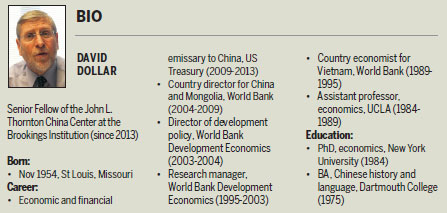
The relationship between the World Bank and the Chinese government was "very good" in general but "it changed over time," he said.
In the early days of Chinese economic reform and opening-up, the World Bank financed the earliest expressways in China and introduced new ideas, including advising China on its accession to the World Trade Organization.
When Dollar arrived in 2004, China was already a middle-income country and one of the biggest economies in the world. Its agenda had also shifted.
"So what I tried to do with the World Bank program was to shift and to focus more on environmental issues and social issues," he said, citing the cleanup of the West Lake in Hangzhou, the Li River in Guilin, the Pearl River in Guangzhou and Suzhou Creek in Shanghai.
"I think we played a helpful role," Dollar said.
In 2006, the Chinese government granted Dollar the "Friendship Award," the top prize for foreign experts who made outstanding contributions to China's social and economic progress.
"I am officially a friend of China," Dollar said with pride.
He had also travelled extensively during the nine years in China, including to remote places such as Xinjiang and Tibet. He pointed to a photo he took of the Qomolangma (Mount Everest), where he slept in a tent at the base of the mountain.
Besides business trips, he also went on many vacations with his family. "Frankly, my family was very happy in Beijing. They didn't want to move back," he said.
His daughter and son attended the Western Academy of Beijing, a private international school, and his wife, who had also studied Chinese in Taiwan, was the best Chinese language speaker at home. "Whenever we travelled around, she would be our spokesperson" Dollar said.
He felt especially privileged to have travelled extensively in China in 1986 because it has given him a perspective on what's been accomplished in China, achievements he calls "really remarkable."
During his trips in 1986, Shanghai's Pudong area was mostly farm fields and there was nothing in Shenzhen but officials saying what they were going to do. "You go around the world and local officials tell you to come back in 10 years and this is going to be a big city, most of the time that's nonsense," Dollar said.
He has since revisited Shenzhen several times. It now boasts a population of over 10 million. "It's unbelievable," he said.
When Dollar left the World Bank in 2009, US Treasury Secretary Tim Geithner hired him as the Treasury emissary in Beijing. Dollar admitted that he was a bit nervous because the World Bank is a friend of China while the US Treasury's relationship with China was more complicated.
"I think in a lot of ways US and China are friends," he said. "But there is also some tension."
Trump policy
Despite tough campaign rhetoric on China, US President Donald Trump has softened his tone since taking office. "It does seem that he is approaching China cautiously, which is probably good," Dollar said.
In his view, the administration might still take some protectionist measures against China, but they will be relatively small and almost symbolic. He is sure that China will retaliate. "But if the measures are small on both sides, then it's a minor annoyance," he said.
"But I could be wrong. I do think if the Trump administration does any major protectionist measures against China, I am sure that China will retaliate in a major way. And that will be quite bad for our two economies," he said.
Dollar believes it's very hard for Trump to bring back the manufacturing jobs lost over the years. "I am pretty sure that protectionism is not going to bring jobs back," he said.
He warned that protectionism might bring some specific jobs back, but it's going to lead to the loss of other jobs - high productivity and high-paying jobs.
"So I think it's a losing strategy," he said.
Dollar finds Trump's economic officials, including internationalists and protectionists, quite inconsistent. "Usually that means within a year, some start winning, some start losing, some leave probably," he said.
In a January article, Dollar dismissed Trump's accusation of China being a currency manipulator by devaluing the RMB. He argued that China has been intervening to keep its currency high, not low.
He also called the big imbalance developed between the two countries in the 2000s as "unfortunate."
"I blame both countries because it takes mistakes on both sides to create that kind of problem," he said.
He believed the US needs more saving while the Chinese should save less but consume more. "So the irony here, the US saves too little, China saves too much. If you put US and China together, it makes a perfect economy, if we actually merge," he joked.
chenweihua@chinadailyusa.com
|
David Dollar, then Beijing-based World Bank country director for China and Mongolia, plays mahjong during a break at a World Bank-financed project in Chongqing, in a file photo taken around 2007. Photos Provided To China Daily |
|
David Dollar and his family pose for a photo at the Mutianyu section of the Great Wall outside Beijing in 2011. |
(China Daily USA 03/10/2017 page11)



